

 The Accurate Reloading Forums
The Accurate Reloading Forums  THE ACCURATE RELOADING.COM FORUMS
THE ACCURATE RELOADING.COM FORUMS  Hunting
Hunting  African Big Game Hunting
African Big Game Hunting  Re: Martini From Nepal Arsenal Treasure Trove
Re: Martini From Nepal Arsenal Treasure TroveGo  | New  | Find  | Notify  | Tools  | Reply  |  |
one of us |
There is a pretty good article in the new "Rifle" magazine about the Nepal Martini's. it also has some load info and such. The story of those rifles is fascinating. Congradulations on your find. | ||
|
| one of us |
| |||
|
one of us |
Since this may be the most popular forum on AR, and many of these old Martini 577/450's were used in Africa for hunting (and social work  ), I decided to post here rather than the single shot or collector forum. ), I decided to post here rather than the single shot or collector forum.I went by Atlanta Cutlery yesterday, and bought one of the Martini 577/450's from the Nepal Arsenal hoard that was recently imported. For more information about this group of weapons, check out the article in American Rifleman. I thought it might be of interest to post a bit about what I saw in the showroom since some of you might be interested in purchasing one. They only had a small rack of rifles (maybe two dozen total)in the showroom among all the reproduction historical and fantasy costumes and edged weapons. There were four or five of the long lever P-1885's, eight short lever P-1871's, three Sniders, and the rest divided between various muzzle loaders. Overall condition was about what you would expect for 115 to 160 year old firearms that have been stored in non-climate controlled conditions for many years. They were all pretty grungy, with dried preservative grease covering most of them. Even with the old preservative, there were some pits evident on most of them, and most showed a good bit of finish wear. If you are looking for excellent plus condition collector grade rifles, you will need to look elsewhere. If you are looking for a little piece of shootable history, then these rifles may be for you. I had been particularly interested in a short lever Martini, or possibly a long lever P-1885 if the P-1871's were not in decent condition. With this in mind, I paid closer attention to the short levers than any of the other rifles. Of these, there was one unmarked receiver (possibly Nepalese?), one BSA&M marked receiver, and the rest were Enfield marked. All, other than the unmarked piece and one 1880's marked Enfield, were 1870's pieces. The 1870's marked rifles are more expensive than the others due to them being in the appropriate age range for the Anglo-Zulu War. I was hoping for a few more specimens to choose from, and had originally intended to go with an 1880's date for the cheaper price (but the 1880's marked Enfield was the worst of the lot  ). After asking if a nicer rifle might be available, the saleslady said that she would ask for more to be brought from the warehouse where they had a "large number" of rifles. I then stood around for a half hour or so, and still no other rifles were forthcoming. A gentleman that I assume to be the owner or manager came by, and to make a long story short, I wound up choosing the best of the 1870's marked rifles. This was an Enfield, although I would have preferred the BSA if condition had been equal. ). After asking if a nicer rifle might be available, the saleslady said that she would ask for more to be brought from the warehouse where they had a "large number" of rifles. I then stood around for a half hour or so, and still no other rifles were forthcoming. A gentleman that I assume to be the owner or manager came by, and to make a long story short, I wound up choosing the best of the 1870's marked rifles. This was an Enfield, although I would have preferred the BSA if condition had been equal.Since this was to be a shooter, I went with what appeared to be the least objectionable bore. All the bores were pretty dirty, and hard to see much of the rifling due to the caked preservative (and rust, etc). This rifle had stronger rifling showing, and less pitting on the outside (probably due to the extra preservative caked on the exterior). When I got it home I spent several hours with a Kroil soaked cleaning cloth removing some of the dark, dried preservative from the exterior metal surfaces. The stock is very dark as well, but does not appear to be so oil soaked as to be too soft. It is similar in appearance to ebony, but while cleaning some dark colored stain-like material was showing up on the cloth, so this may be the reason for the dark color. Only two of the rifles had stocks that appeared dark like this, and both of these had a slightly different contour on the bottom of the forearm (less rounded at the reciever). The other stocks were walnut in varying degrees of condition. It is going to be interesting to take this stock off and see what the inside looks like. After patching out the bore with Kroil, I made a half dozen passes with a brush. The change was dramatic  . Now the rifling appeared very strong and smooth, maybe not mint, but extremely nice. . Now the rifling appeared very strong and smooth, maybe not mint, but extremely nice.It may not be a "looker", but I hope it will be a shooter with this good a bore. I still have to slug the bore to determine proper dimension for bullets. I did not have a soft lead ball or bullet of appropriate size handy, but it appears that it will be between .465-.468. Now I need brass, dies, and bullets!!!! If anyone has a suggestion for some less expensive alternatives to Bertram, CH4D or RCBS, and a custom mold, PLEASE LET ME KNOW !!!! I will add a few pics. If anyone would like more, I will be glad to post photos of anything on the rifle that you might be interested in. Jim Here is the before shot of the action, old grease, dirt, and general grime still in place. 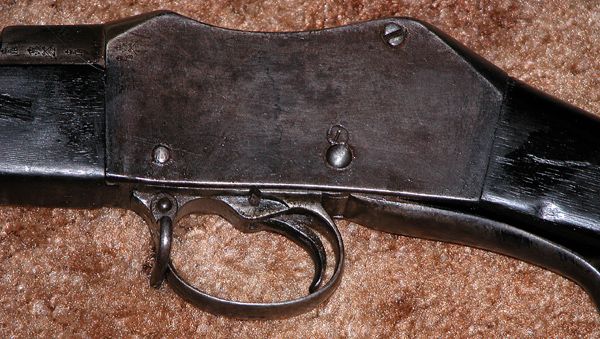 Here is the After shot of the action, plus the bore, the proof marks (maybe you Martini collectors can add a little more info on this older system of markings), and a full length shot. 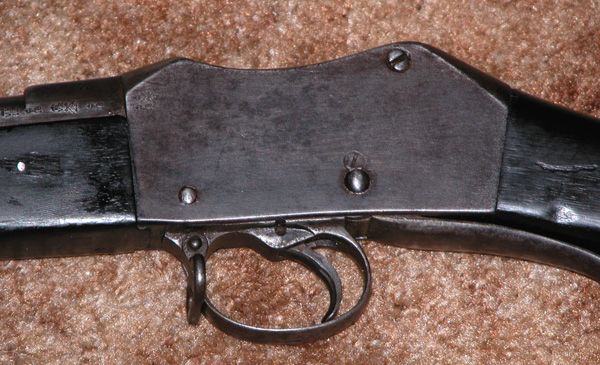 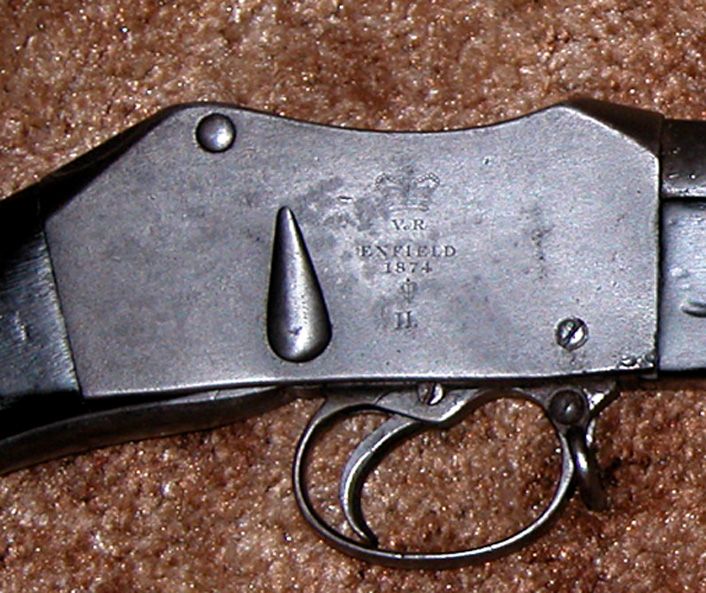 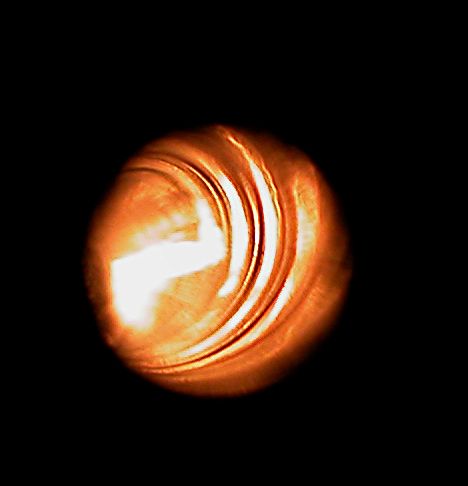 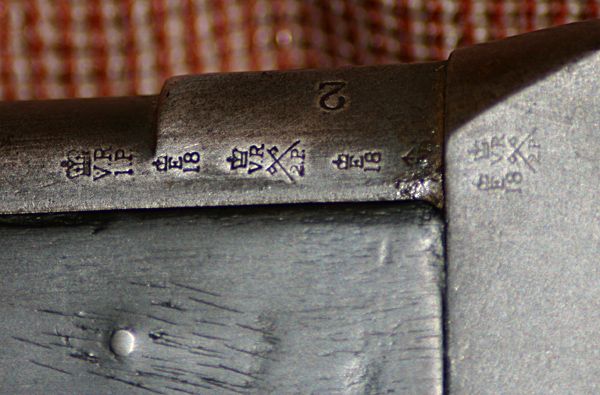  | |||
|
| one of us |
I'm in the Atlanta area , where is Atlanta Cutlery located | |||
|
one of us |
Don, Thanks for the info. Sounds like an "interesting" use of toilet paper  . I certainly do know the type you mean---been there, done that, thought I was using sandpaper . I certainly do know the type you mean---been there, done that, thought I was using sandpaper  . as Martinibelgian mentioned, if the bore on my rifle is on the large side I intend to patch some 500 grain .458 cast bullets that I have on hand to try. Seems like a fun shooter. . as Martinibelgian mentioned, if the bore on my rifle is on the large side I intend to patch some 500 grain .458 cast bullets that I have on hand to try. Seems like a fun shooter.M1, Dave, Gadge, and Martinibelgian, Thanks for the suggestions and info. When I get some brass I will initially try neck sizing in the 458 mag die, or one of my other obsolete 45 cal die sets that might fit better (depending on groove diameter, which will dictate bullet diameter, and therefore neck diameter). I just hate to give $5 per piece for brass  . Hopefully with all the new Martini shooters around someone will make a run of less expensive brass (maybe we should contact Starline). . Hopefully with all the new Martini shooters around someone will make a run of less expensive brass (maybe we should contact Starline).johnrigby, Atlanta Cutlery is actually located in Conyers. I would post a link to their web site, but it seems to be down today. Just do a web search, and when it is active again they have directions from I 20 to the sales room. Jim | |||
|
| One of Us |
Mbongo375 Welcome to the world of gentlemen hunters- and grey hair  I shot my first kudu with my grandfathers Martini carbine. The same one he carried up as a wagon driver with the pioneer corps in 1890. Since then my hair has gone from almost black to grey - and it is not with age just trying to get Martini reloads to shoot!!!! I shot my first kudu with my grandfathers Martini carbine. The same one he carried up as a wagon driver with the pioneer corps in 1890. Since then my hair has gone from almost black to grey - and it is not with age just trying to get Martini reloads to shoot!!!!For accuracy, shoot modern Kynamco. For fun :- I deprime military brass with a berdan decapper, place primer into pocket and tap in with dowel. fill case with FG grade cheep chinease powder. Wrap cast 230grn round nosed bullet intended for .45 ACP with a square of toilet paper (local john wayne stuff - you know, Rough, Tough and don't take Sh!t from no one rather than the kleenex super soft) Twist bullet into the case. The paper ensures a good fit. Chamber and fire. I get a 6" group at 50 yards with this, but it is fun and about the same I get with just about all conventional loads save original, Kynamco or very very carefully assembled loads using beeswax fillers, interior paper liners etc.!!! | |||
|
| one of us |
Have you seen this site: Martini markings It covers both the wood and metal markings pretty well. I'll bet you can find out more info on your gun's history there. maxman | |||
|
| one of us |
Mbogo, Brass- depends if you prefer drawn or turned brass. The turned stuff is cheaper, but the drawn stuff much better - there is Bertram and Kynamco with drawn. Bullets - Yours appears to be a Mk II ( even though it has the large Mk I cocking indicator), so bulelt dia. will be somewhere between .462 and .465 - better slug. You can either patch up a standard .459 bullet, or use a custom mould. About 500 grs is right (think Lyman 457125 and 457132). About 85 grs of Fg, and a nice wad column will do (vard wad, lubed felt wad, card wad beneath bullet base). on the ezboard forum Coyote sells correctly-dimensioned cheap lee moulds, and then there are the CBE mould from OZ - long waiting time though. Brass will never be cheap, and cheaper dies than CH4D is hatrd - but in a pinch you can use a cut-down .458 win mag die for necksizing only, if you only have 1 rifle. And they are quite addictive to shoot.... | |||
|
one of us |
maxman, That is a great site!!! It confirms some things that I suspected. My rifle was apparently a Mark I that has been converted to a Mark II at some point. It would be interesting to know if some of these Martini's saw use in the Anglo-Zulu War. I suppose that it might be possible, as many weapons were relegated to "provincial service" (or native service as these Martini's are marked)when they were withdrawn from service with the regular forces. I look forward to shooting it. Thanks, Jim | |||
|
| one of us |
Quote: LMAO  I had started a strand about these in the SS forum. There are some sites that carry theese guns and for a small premium offer hand selects for a few bucks more. I had started a strand about these in the SS forum. There are some sites that carry theese guns and for a small premium offer hand selects for a few bucks more. | |||
|
| one of us |
M,when I work at Chesapeake Gun Works years ago they had a set of forming dies from RCBS,and I believe they used 577 basic brass, If you need it and have a fax I have a copy of a loading book that was written in the 60's for the round,I would be glad to share | |||
|
| Powered by Social Strata |
| Please Wait. Your request is being processed... |
|
 The Accurate Reloading Forums
The Accurate Reloading Forums  THE ACCURATE RELOADING.COM FORUMS
THE ACCURATE RELOADING.COM FORUMS  Hunting
Hunting  African Big Game Hunting
African Big Game Hunting  Re: Martini From Nepal Arsenal Treasure Trove
Re: Martini From Nepal Arsenal Treasure Trove

Visit our on-line store for AR Memorabilia

